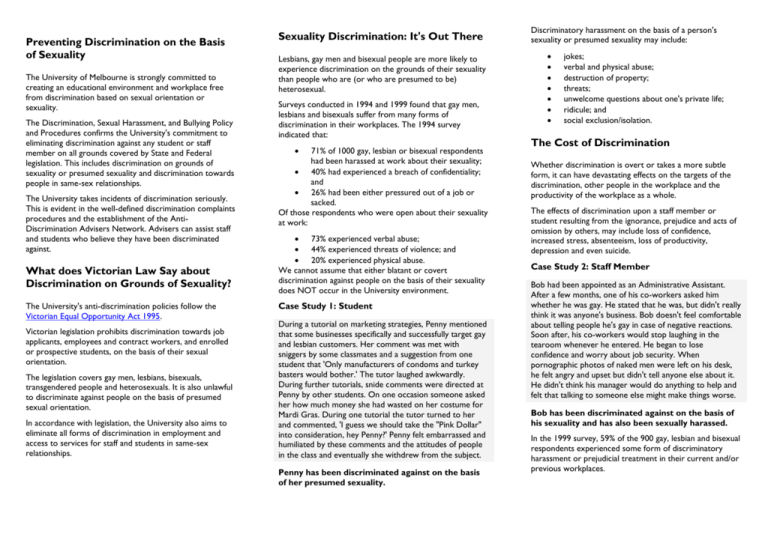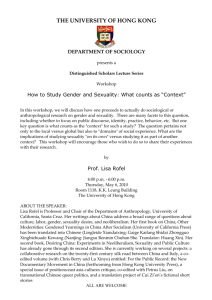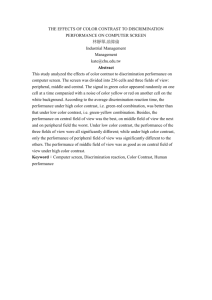
Preventing Discrimination on the Basis
of Sexuality
The University of Melbourne is strongly committed to
creating an educational environment and workplace free
from discrimination based on sexual orientation or
sexuality.
The Discrimination, Sexual Harassment, and Bullying Policy
and Procedures confirms the University's commitment to
eliminating discrimination against any student or staff
member on all grounds covered by State and Federal
legislation. This includes discrimination on grounds of
sexuality or presumed sexuality and discrimination towards
people in same-sex relationships.
The University takes incidents of discrimination seriously.
This is evident in the well-defined discrimination complaints
procedures and the establishment of the AntiDiscrimination Advisers Network. Advisers can assist staff
and students who believe they have been discriminated
against.
What does Victorian Law Say about
Discrimination on Grounds of Sexuality?
The University's anti-discrimination policies follow the
Victorian Equal Opportunity Act 1995.
Victorian legislation prohibits discrimination towards job
applicants, employees and contract workers, and enrolled
or prospective students, on the basis of their sexual
orientation.
The legislation covers gay men, lesbians, bisexuals,
transgendered people and heterosexuals. It is also unlawful
to discriminate against people on the basis of presumed
sexual orientation.
In accordance with legislation, the University also aims to
eliminate all forms of discrimination in employment and
access to services for staff and students in same-sex
relationships.
Sexuality Discrimination: It's Out There
Lesbians, gay men and bisexual people are more likely to
experience discrimination on the grounds of their sexuality
than people who are (or who are presumed to be)
heterosexual.
Surveys conducted in 1994 and 1999 found that gay men,
lesbians and bisexuals suffer from many forms of
discrimination in their workplaces. The 1994 survey
indicated that:
71% of 1000 gay, lesbian or bisexual respondents
had been harassed at work about their sexuality;
40% had experienced a breach of confidentiality;
and
26% had been either pressured out of a job or
sacked.
Of those respondents who were open about their sexuality
at work:
73% experienced verbal abuse;
44% experienced threats of violence; and
20% experienced physical abuse.
We cannot assume that either blatant or covert
discrimination against people on the basis of their sexuality
does NOT occur in the University environment.
Case Study 1: Student
During a tutorial on marketing strategies, Penny mentioned
that some businesses specifically and successfully target gay
and lesbian customers. Her comment was met with
sniggers by some classmates and a suggestion from one
student that 'Only manufacturers of condoms and turkey
basters would bother.' The tutor laughed awkwardly.
During further tutorials, snide comments were directed at
Penny by other students. On one occasion someone asked
her how much money she had wasted on her costume for
Mardi Gras. During one tutorial the tutor turned to her
and commented, 'I guess we should take the "Pink Dollar"
into consideration, hey Penny?' Penny felt embarrassed and
humiliated by these comments and the attitudes of people
in the class and eventually she withdrew from the subject.
Penny has been discriminated against on the basis
of her presumed sexuality.
Discriminatory harassment on the basis of a person's
sexuality or presumed sexuality may include:
jokes;
verbal and physical abuse;
destruction of property;
threats;
unwelcome questions about one's private life;
ridicule; and
social exclusion/isolation.
The Cost of Discrimination
Whether discrimination is overt or takes a more subtle
form, it can have devastating effects on the targets of the
discrimination, other people in the workplace and the
productivity of the workplace as a whole.
The effects of discrimination upon a staff member or
student resulting from the ignorance, prejudice and acts of
omission by others, may include loss of confidence,
increased stress, absenteeism, loss of productivity,
depression and even suicide.
Case Study 2: Staff Member
Bob had been appointed as an Administrative Assistant.
After a few months, one of his co-workers asked him
whether he was gay. He stated that he was, but didn't really
think it was anyone's business. Bob doesn't feel comfortable
about telling people he's gay in case of negative reactions.
Soon after, his co-workers would stop laughing in the
tearoom whenever he entered. He began to lose
confidence and worry about job security. When
pornographic photos of naked men were left on his desk,
he felt angry and upset but didn't tell anyone else about it.
He didn't think his manager would do anything to help and
felt that talking to someone else might make things worse.
Bob has been discriminated against on the basis of
his sexuality and has also been sexually harassed.
In the 1999 survey, 59% of the 900 gay, lesbian and bisexual
respondents experienced some form of discriminatory
harassment or prejudicial treatment in their current and/or
previous workplaces.
Prejudicial treatment or practices on the basis of a person's
sexuality may include:
loss of, or threat of loss of job;
being overlooked for promotion;
not being offered overtime, additional training or
other development/advancement opportunities;
undervaluing your work;
unfair work expectations;
limited or no salary increase; and
discriminatory recruitment practices.
Case Study 3: Staff Member
Tara is a lesbian employed in a senior position in a specialist
unit at the University. She has been 'out' to a few people at
work whom she felt she could trust, but recently started
receiving anonymous internal mail containing offensive
sexual material and 'hate mail'. She approached her
supervisor, with whom she had not been open to
previously about her sexuality, to discuss the matter. He
said she was foolish to have told anyone and that he
couldn't do anything about it. She felt anxious about coming
into work and guilty about drawing attention to her
sexuality, despite the fact that many of the other women in
the unit regularly mentioned their male partners. She found
it increasingly difficult to concentrate on her work and was
fearful about her impending performance appraisal.
Tara has been discriminated against on the basis of
her sexuality and has also been sexually harassed.
Creating a workplace culture that is inclusive of difference
allows each student and staff member to feel valued for
their particular contribution. Such an environment creates
trust and loyalty, rather than fear and disillusionment.
Not every person's personal attitudes and beliefs can be
changed. In some instances, a person may hold religious
beliefs that are discriminatory towards lesbian, gay and
bisexual people. However, each student and staff member
is bound by law and the University's policies to act in
accordance with the principles of equal opportunity and
non-discriminatory work practices. This means that, as
students or staff, they are required to respect the rights of
all people in the University community.
It is important for students and staff to know that
discrimination on the basis of sexuality is unacceptable.
There are policies and procedures in place at the University
to deal with, and hopefully resolve, such matters.
Speak Up!
If you think you have been discriminated against it may be
sufficient to make it clear that the discriminatory act is
offensive to you.
If you are a witness to sexuality discrimination you can
approach the person or people whom you believe are
acting in a discriminatory manner and tell them that it is
offensive.
You can keep a record of the facts and incidents that, in
your opinion, amount to acts of discrimination. Keep track
of dates, times, witnesses and how you feel about what has
happened or is happening to you or another person.
Where to Get Advice and Support
The University has a network of Anti-Discrimination
Advisers who are there to advise you if you believe you
have been discriminated against or harassed on the basis of
your sexuality.
Contact the Equal Opportunity Unit either by telephone on
8344 4438 or at the through our website:
Somewhere
over the
Rainbow:
Eliminating
Sexuality
Discrimination
Diversity on Campus
Respect for diversity depends upon our ability to be open
and sensitive to the differences of others and our own
differences to them. Respect for diversity means an
acceptance that there are many different ideas and lived
experiences contributing to the University community.
Remember we all have a right to equal treatment and
opportunities whatever our sexuality.
Respect for difference in sexuality can be reflected in a
willingness to move beyond negative stereotypes or
assumptions about gay, lesbian, bisexual, and/or
heterosexual people.
References
Benefits of Respecting Diversity
http://www.hr.unimelb.edu.au/strategic/equity-diversity/
'Not a Day Goes By': Report on the GLAD Survey
into discrimination and violence against lesbians
and gay men in Victoria, Gay Men and Lesbians
Against Discrimination, Melbourne, 1994.
'The Pink Ceiling is Too Low':Workplace
Experiences of Lesbians, Gay Men and
Transgender People, Report of a Collaborative
Research Project undertaken by the Australian
Centre for Lesbian and Gay Research and the
NSW Gay and Lesbian Rights Lobby, University of
Sydney, 1999.
© People and Fairness Unit
Human Resources, University of Melbourne
July 2010
The profile of the University community reflects the
heterogeneity of Australia's population in terms of diversity
of sexualities. The reality of diversity is reason enough to
develop and maintain policies, procedures and programs to
eliminate sexuality-based discrimination and encourage
respect for diversity. This benefits everyone by creating the
circumstances in which ALL staff and students can
contribute freely to a vibrant and productive social and
work environment.
A recognition of these benefits has led the University to
develop a Cultural Diversity Policy that outlines a
commitment to celebrating and encouraging difference,
including differences in sexuality.







